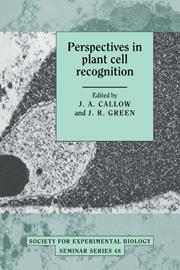Book contents
- Frontmatter
- Contents
- List of contributors
- Preface
- Sexual signalling in Chlamydomonas
- Gamete recognition and fertilisation in the fucoid algae
- The fungal surface and its role in sexual interactions
- Gamete recognition in angiosperms: model and strategy for analysis
- The molecular biology of self-incompatible responses
- Cell surface arabinogalactan proteins, arabinogalactans and plant development
- Local and systemic signalling during a plant defence response
- Contact sensing during infection by fungal pathogens
- The electrophysiology of root–zoospore interactions
- Molecular differentiation and development of the host–parasite interface in powdery mildew of pea
- Recognition signals and initiation of host responses controlling basic incompatibility between fungi and plants
- Cell surface interactions in endomycorrhizal symbiosis
- Host recognition in the Rhizobium leguminosarum–pea symbiosis
- The Rhizobium trap: root hair curling in root–nodule symbiosis
- Structure and function of Rhizobium lipopolysaccharide in relation to legume nodule development
- Index
- Plate section
Preface
Published online by Cambridge University Press: 07 May 2010
- Frontmatter
- Contents
- List of contributors
- Preface
- Sexual signalling in Chlamydomonas
- Gamete recognition and fertilisation in the fucoid algae
- The fungal surface and its role in sexual interactions
- Gamete recognition in angiosperms: model and strategy for analysis
- The molecular biology of self-incompatible responses
- Cell surface arabinogalactan proteins, arabinogalactans and plant development
- Local and systemic signalling during a plant defence response
- Contact sensing during infection by fungal pathogens
- The electrophysiology of root–zoospore interactions
- Molecular differentiation and development of the host–parasite interface in powdery mildew of pea
- Recognition signals and initiation of host responses controlling basic incompatibility between fungi and plants
- Cell surface interactions in endomycorrhizal symbiosis
- Host recognition in the Rhizobium leguminosarum–pea symbiosis
- The Rhizobium trap: root hair curling in root–nodule symbiosis
- Structure and function of Rhizobium lipopolysaccharide in relation to legume nodule development
- Index
- Plate section
Summary
This volume is a collection of papers presented at the ‘Perspectives in Cell Recognition’ Seminar Series symposium during the annual SEB conference held at Birmingham University, UK, in April 1991. The basic purpose of the sessions was to bring together biologists working on diverse aspects of recognition in plants to discuss recent progress in our understanding of ‘self’ and ‘non-self’ interactions between cells. The two major areas of biological interactions covered were those involving dissimilar cells of the same organism associating as gametes in sexual reproduction, and those involving cells of different or ‘foreign’ organisms, associating in either pathogenesis or mutualistic symbioses. It is in these areas that greatest progress has been made in understanding the cellular, molecular and genetic mechanisms involved and in some cases, notably in the Rhizobium–legume symbiosis, the actual genes that control specificity and which are involved in creating a harmonious mutualism have been cloned and their products characterised. Also included are contributions on the exciting progress that is being made in characterising the surface glycoproteins of higher plants that are involved in associations between somatic cells that are crucial to coordinated tissue development, and aspects of cell–cell communication involved in the systemic responses of plants to wounding or pathogenic stimuli.
It was, of course, tempting to include contributions on many other aspects of recognition, such as work on plant hormone receptors and environmental cues, and the intracellular signalling responses associated with recognition.
- Type
- Chapter
- Information
- Perspectives in Plant Cell Recognition , pp. xv - xviPublisher: Cambridge University PressPrint publication year: 1992

